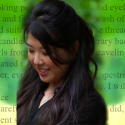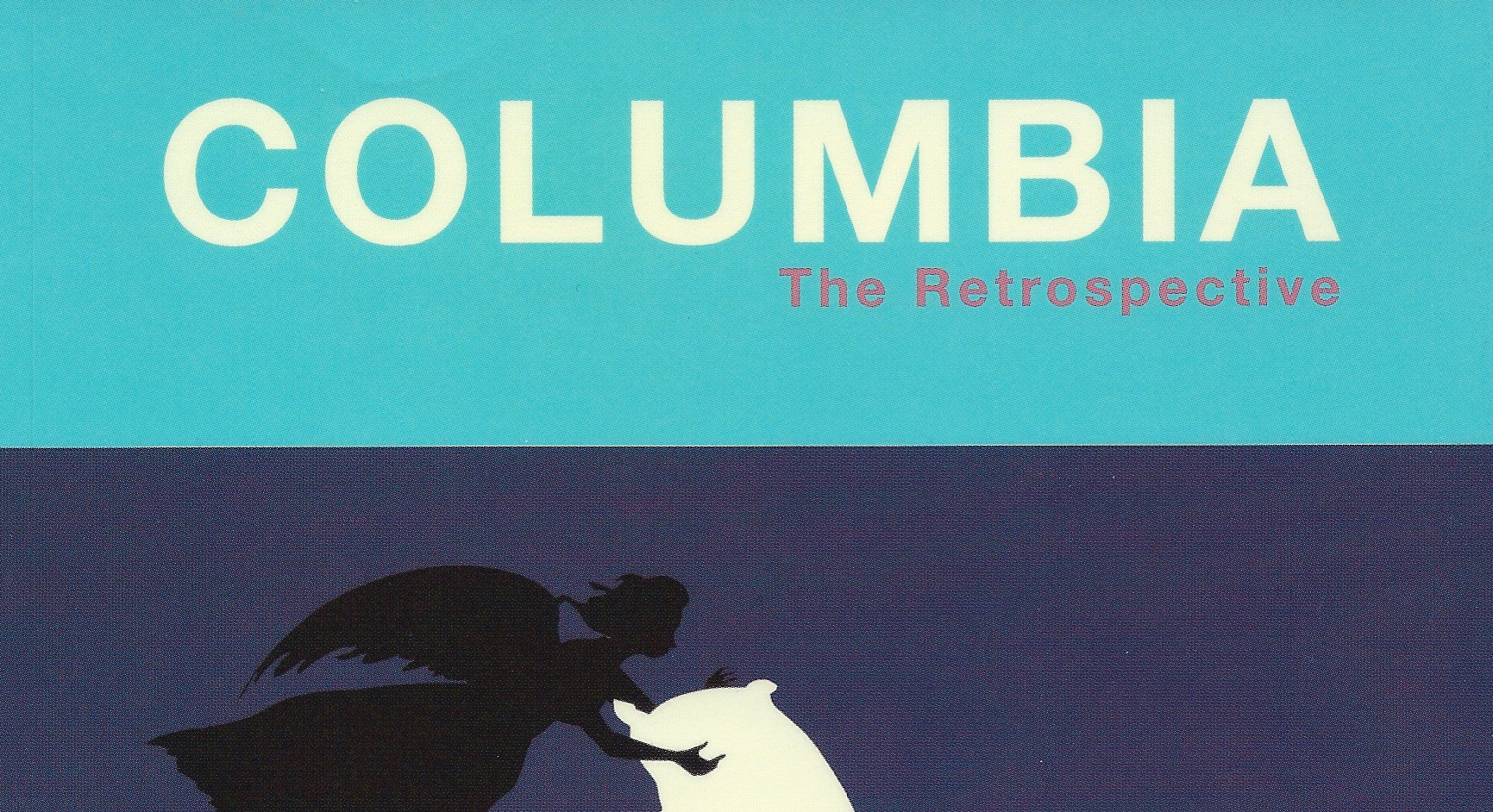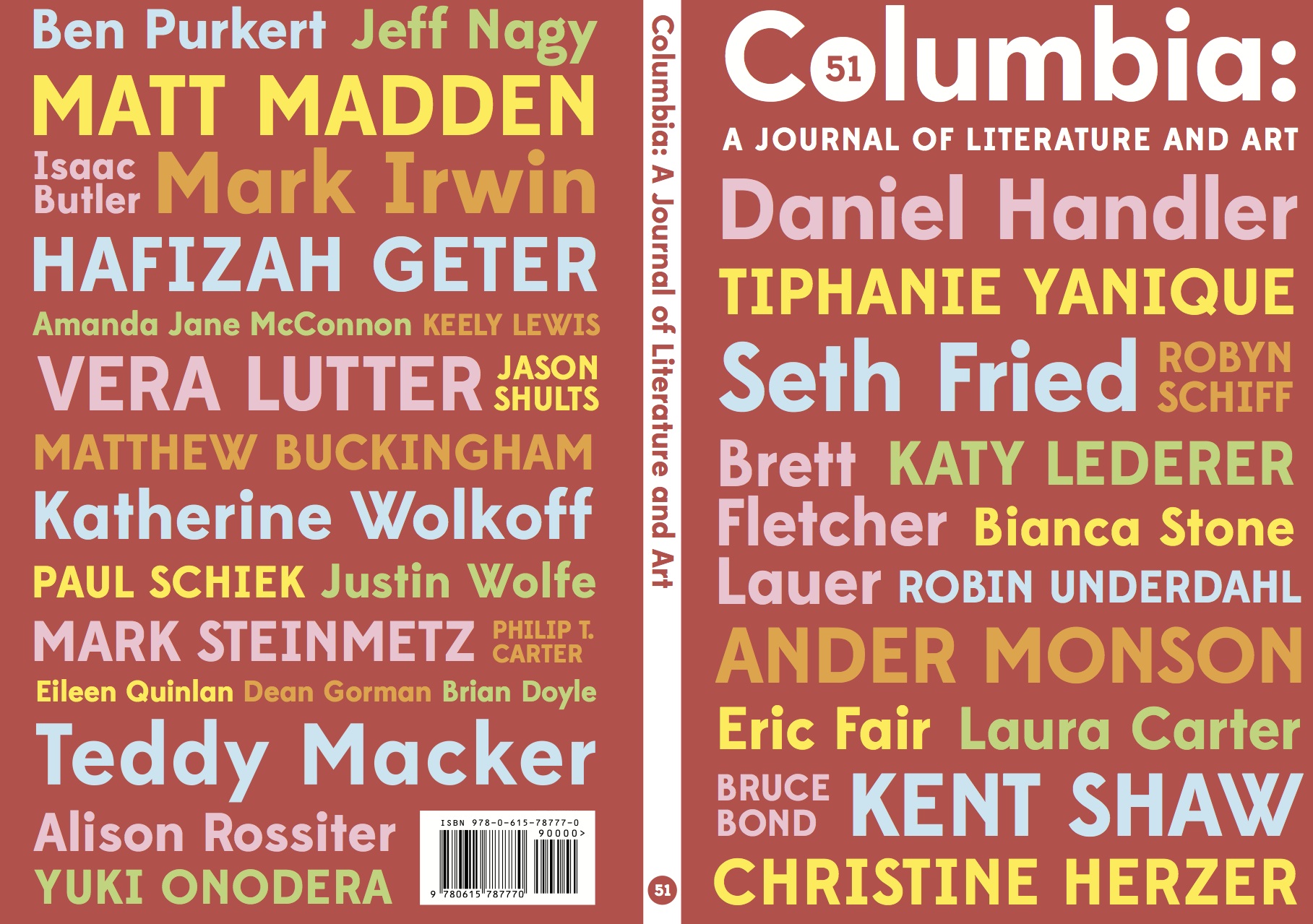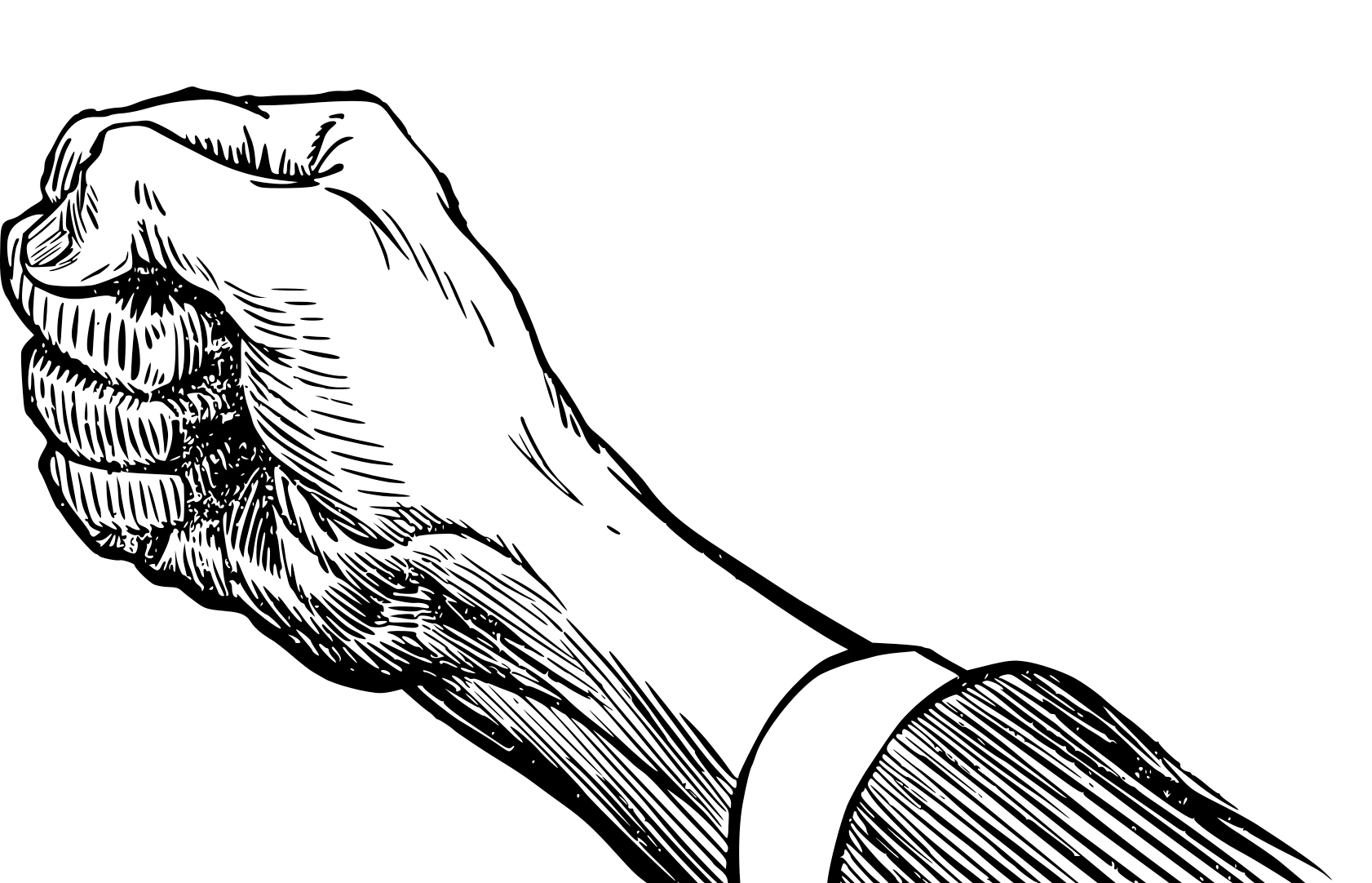Marci Calabretta Cancio-Bello is the author of Hour of the Ox, which won the 2015 AWP Donald Hall Prize for Poetry, and Last Train to the Midnight Market (2013), and has received poetry fellowships from Kundiman and the Knight Foundation, among others. Her work has appeared or is forthcoming in Best New Poets 2015, Narrative Magazine, Paper Darts, Southern Humanities Review, Columbia: A Journal of Literature and Art, and more. She serves as co-founder and managing editor for Print-Oriented Bastards, a contributing editor for Florida Book Review, and producer for The Working Poet Radio Show. Visit her at www.marcicalabretta.com.
It was June. Marci and I were having lunch outside in downtown Miami, beneath a large umbrella. I had just completed the first year of my MFA in poetry at Columbia. Marci had just graduated from her MFA program at FIU. Rain drizzled on and off, cooling the otherwise humid Miami air, as we talked about my upcoming thesis year, and her recent thesis defense. Marci told me she’d been sending out poems from her manuscript, Hour of the Ox, which had a different title then, and she’d been enduring a season of rejections. I asked Marci to send me the manuscript: a series of stunning, lyrical poems, often elegiac, about an invented immigrant family. I had just been appointed to serve as Poetry Editor of Columbia: A Journal of Literature and Art for the next year. Once autumn arrived, I carefully read through the manuscript again with my poetry board, and we collectively solicited “Old Country, New World” for publication in issue 53.
I met Marci three years ago at the New York State Summer Writer’s Institute at Skidmore College, in Saratoga Springs, NY. We spent the month of July studying poetry in the same workshop. She was on the cusp of entering her second year of her MFA in poetry at Florida International University, a three-year program. I was a senior in college, and just beginning to take myself seriously as a writer, contemplating the MFA.
I remember even then a distinct fierceness about Marci. She wore black button downs and simple T-shirts, bell-bottom jeans, and black converse. A section of her straight black hair was dyed green (which she later revealed was meant to be blue, but the color took on a life of its own). When she spoke in workshop, she commanded the room by her clarity, deep understanding of poetic craft, and her grace. I admired her for how focused she was, the way she marked everyone’s poems with red and green pens: one color for her prior feedback, the other for feedback during workshop. And her poems were striking. So alive on the page, lyrical, and urgent. It was obvious to all of us in our workshop, even me who had very little experience in the world of poetry at that point, that Marci was a poet to watch.
This past July, after returning from a second summer at Skidmore, I sat barefoot on the front stoop of the house where I grew up in New Jersey, and caught up with Marci over the phone. She wanted to burn her thesis, with its plague of first book rejections, and I wanted to throw my thesis out the window, for fear of my own bleak hallway of future rejections. The two questions we both seriously considered: Does publication really matter? Is getting published really the point of writing?
The next morning I awoke to a text from Marci with a screen shot of an email. She won the 2015 Donald Hall First Book Award for Poetry for Hour of the Ox.
The despair that can be brought on from rejection, and anxiety about what comes next with the thesis after completion of the MFA, are the reasons I decided to conduct this interview. I’d be lying if I said I do not desire publication, the object of the book, validation for my time, effort, and money. But the process of getting published involves persistence, and luck, and includes subjectivity (think of all those screeners and judges who alternate each year, all those different tastes). While we continue to revise and grow as writers, it’s important to remember the value of participating in the writing community, and to nurture and celebrate our community. And above all, as Vonnegut puts it, “God damn it, you’ve got to be kind.”
– Carlie Hoffman
COLUMBIA JOURNAL
How do you begin a poem?
CALABRETTA CANCIO-BELLO
There’s an infograph going around the internet called “The Daily Routines of Famous Creative People” such as Mozart and Voltaire and Maya Angelou. Writing is so solitary that we want to find solidarity with successful people, as if to say, “I too wake up at 3 a.m. to write; I also doodle in my purple unlined Moleskine journal; I too put salt on my ice cream.” We are obsessed with knowing, and claiming some measure of fame by association, hoping that the secret to success is somehow quantifiable in the details of process.
For me, and I’m sure for most writers, there is no single way to answer your question. Every writer probably has fall-back methods, but the idea of evolving as a writer requires that our writing processes also expand. These days, writing a poem is much like trying to get to the center of a Tootsie Pop. I hear a line and mull it over, listening to its rhythms and substance until the rest of the poem shapes itself around the original impulse. Usually this is the opening line, but not always. Sometimes it’s more difficult if it is the ending of the poem, because then I have to write a poem that lives up to the ending.
COLUMBIA JOURNAL
What’s your revision process like after you start a poem?
CALABRETTA CANCIO-BELLO
I am a heavy reviser. Some people can draft several revisions in their head before they write anything down, but I tend to revise more clearly once I can visualize the words on paper. Jim Daniels gave me the best advice for revision: start with a fresh page; every draft is a slate wiped clean so you can constantly rethink your work.
Allison K. Williams recently posted an article on Brevity’s blog called “How Many Drafts Must a Writer Draft?” She says the answer is seven. That’s probably as good an answer as any. As writers, we should examine our work carefully and critically. If it was easy, more people would do it.
COLUMBIA JOURNAL
How did poetry begin for you?
CALABRETTA CANCIO-BELLO
As a child, I read everything I could get my hands on: books, brochures, posters, even the fine print on the shampoo bottles and the bottom of the Kleenex box. I used to bring home boxfuls of old, obscure novels and volumes of poetry full of mold from library and garage sales. I was obsessed with the British Romantic poets.
Despite that, I was convinced that fiction was my calling. I wrote my first short stories at age seven, and recorded them on cassette tapes. My parents gave me an electric typewriter a few years after that, and my stories grew longer, though no less terrible. All this time, I was writing sentimental poems personalized for family members on special occasions. They were awful, clumsy creations that adhered to specific syllable counts and easy end-rhymes, but people seemed to like them.
COLUMBIA JOURNAL
Did you start to write poetry in high school or college, then?
CALABRETTA CANCIO-BELLO
By college, I was writing both fiction and poetry, plotting out stories and making character sheets, trying to wrap my head around the notion of freeform poetry. My creative writing professor, Ron Starmer, introduced me to Billy Collins and the Beats. I think most writers take these names for granted now, but I was blown away. I had no idea that literature was allowed to be so bold, much less be so revered.
Permission was huge for me back then. Back then, I was working two jobs and overloading on credits because people kept telling me I wasn’t the “ideal candidate” on paper. I couldn’t give myself time for my prose to develop, but I could hold entire poems in my head at a time. Terrance Hayes introduced me to every historical school of poetry and said, “Try everything.”
COLUMBIA JOURNAL
When you started to look into MFA programs, were you planning to apply for fiction or poetry?
CALABRETTA CANCIO-BELLO
Jim Daniels, my adviser at that time, is able to work fluidly between fiction and poetry himself, and taught me how to apply things I’ve learned from one genre to another. My senior honors thesis was a linked series of these short, strange, experimental short stories, and poetry. Jim advised against it, and the fiction portion was awful, but I learned so much struggling to reconcile the two genres. The poetry portion later became my chapbook, Last Train to the Midnight Market, after a year of heavy revision.
When I began applying to MFA programs, Jim told me that my fiction was not strong enough to be accepted, but if I applied for poetry, I had a shot. I was crushed, but of course we both knew he was right. I have a lot of respect for him, especially for his constructive honesty, which seems like such a rare commodity in literary circles these days. Under the right circumstances, discouragement can be as valuable as encouragement to a young writer.
COLUMBIA JOURNAL
Do you have any poets you find yourself continually going back to?
CALABRETTA CANCIO-BELLO
Ai is among my earliest influences. Her work taught me about the malleability of identity and perspective, of distance and intimacy with violence. She wrote these dramatic monologues of such dark personae fiercely and without apology, and, I think, they still perplex critics. For example, what reconciliations did she make between her poetry and her decisions to study Buddhism? But more simply, for me, in the era of Plath and Kerouac and the indisputable celebratory “I,” her lack of autobiographical content is absolutely freeing.
I always return to Li-Young Lee and Robert Hass and Jane Hirshfield, constantly asking much of their poems: how they wrote them, choosing and sharpening each moment, how they followed each movement from consciousness to ink.
Often I find myself remembering single poems for the rhythms of language and line breaks. Tracy K. Smith, whose work and person I admire greatly, included a poem called “Appetite” in her first book, The Body’s Question. In the poem, Smith describes a father at dinner after a long day of work:
Ready to raise a leg of chicken to his lips,
Then a wing; to feel the heat enter through his teeth,
Skin giving way like nothing else
Will give way to him in this lifetime.
I still marvel at that last line break, the perfect enjambment, and the specificity that reveals so much in so little.
Louise Glück is another writer I carry with me. Each of her books is vastly different, but also very much Louise Glück. These days I keep hearing the opening to “The Wild Iris” in my head: “At the end of my suffering / there was a door.” I think it is a phrase I need to hear, as my poetry evolves.
People always seem surprised when I name Dean Young as an inspiration. In college, I taped a copy of “Sunflower” to the wall over my desk and never took it down. His poems remind me to challenge any limits and expectations I have imposed on language and consciousness, and even poetry itself.
COLUMBIA JOURNAL
Has your idea or understanding of what poetry is transformed since you started writing poetry?
CALABRETTA CANCIO-BELLO
When I was in college, I didn’t know what to think of poetry beyond the fact that I loved reading and writing it. During my MFA, I learned how to articulate my ideas of craft and critique, and how to sharpen my focus. I’ve also been fortunate to attend several writing conferences. The NY Summer Writers Institute at Skidmore College was one of the best conferences I’ve ever seen, and I still meditate on the illuminating craft talks I heard there. I also discovered a few great friends and a few great readers, which became an essential network of support after I graduated.
COLUMBIA JOURNAL
What’s the most valuable thing you’ve learned from studying poetry at writing conferences and at the graduate level?
CALABRETTA CANCIO-BELLO
Perhaps the most valuable thing I have learned so far is to appreciate work of every style, even if it is incredibly different from my own. When we start out, we tend to read the poetry that is most similar to what we strive for in our own work. We think that’s what poetry is. But once we learn to value styles outside of our comfort zone, I consider that a mark of growth. Our understanding of what poetry is expands and encompasses more than we thought possible.
Poetry can hold so much, and can be quite powerful if we are aware of it, and the same poem resonates differently for each person, and even for ourselves at various moments in our lives, taking into account our experiences and the way our mind works. Because of that, I think our idea of what poetry is should be continuously evolving. As humans, we always want an answer that fits easily into a quotable sound-byte, but the truth is that the answers are complex and ever-changing.
COLUMBIA JOURNAL
Say your poems are a rare species of bird that nest in the tree of you. What bird?
CALABRETTA CANCIO-BELLO
BBC did a story in early 2014 on these Mongolian falconers who start training as children. As soon as they are old enough to bear the weight of the bird on their forearms, they take a wild eagle chick from the nest, and train it themselves. There is always an initiation test: if the eagle makes the kill, both the child and bird are considered full hunters; if the eagle doesn’t, the child releases it and has to start all over. After years of service, the mature eagle is released to mate and live out the rest of its life in the wild. As a farewell gift, the hunter leaves some sort of kill on the mountain. The Kazakh falconers are clear that they do not tame the birds; rather, they harness the eagles’ wild hunting instincts for mutual benefit. It’s a striking and symbiotic relationship that I can relate to with my poetry. Even the quietest poem can be “wild” and “fierce,” and we are only able to harness, not tame, its rugged nature. This is parallel to Elizabeth Gilbert’s belief in the old Greek myths that artists are not geniuses themselves; they have geniuses lent to them by the gods.
In reality, most of my poems are less of a fierce golden eagle and probably more like the Marvelous Spatuletail, a tiny, jeweled Peruvian hummingbird species with long twin tail feathers that look like purple spatulas. Hummingbirds are deceptively aggressive little creatures, and these are no exception. But the double-tail is remarkably odd and entertaining. Both single feathers can be separately controlled, and the courtship dance borders on ridiculous. I see my poems existing in the world in a similar manner: small and quirky creatures flickering, easy to miss but at times just strange enough to catch the eye.
COLUMBIA JOURNAL
This past summer you received the wonderful news that your manuscript, Hour of the Ox, was selected for the 2015 Donald Hall Prize for Poetry for a first book of poems. What was that experience like?
CALABRETTA CANCIO-BELLO
A call came through my Bluetooth as I was driving to work. Ms. Supriya Bhatnagar, Director of Publications at AWP, personally called me to share the news. I was so shocked that I nearly rear-ended a poor woman in a Volkswagon. It is true that the body can shiver with joy. I was amazed how gracious my colleagues were in celebrating with me; too often we get caught up in the competition and forget to celebrate all the good things in the world.
COLUMBIA JOURNAL
Is Hour of the Ox your thesis manuscript?
CALABRETTA CANCIO-BELLO
Hour of the Ox was a version of my thesis manuscript. Working with Campbell McGrath as my thesis adviser was incomparable. As I wrote these poems, I kept calling my thesis a “book,” which Campbell kept telling me not to, and he was right. We put so much pressure on our thesis projects to become our first books that it can become paralyzing if our work doesn’t get picked up right away.
COLUMBIA JOURNAL
After you graduated from the MFA, did you submit your thesis to contests right away?
CALABRETTA CANCIO-BELLO
Right after I defended my thesis manuscript, I pulled out four poems and sent them out to several contests. I believed the whole manuscript was ready for publication; each rejection told me that it wasn’t. Publication is subjective to an ever-rotating roster of screeners, editors, and judges, but I began to recognize a distinct divide between the manuscripts that won and those that didn’t, mine included. Rejection is, in itself, valuable experience, and a form of revision.
The Latin origin of “revise” means to “look at again.” Re-envision. I spent a year revising the book. Perhaps two poems were exchanged. All the poems were reordered. I forget who said that the last poem you write for your book is the overall order.
COLUMBIA JOURNAL
What did your days look like during the stretch between graduating from the MFA and the acceptance of your manuscript for publication?
CALABRETTA CANCIO-BELLO
In the middle of writing my thesis, I married my husband, Guillermo, who is also a poet. It wasn’t until after I graduated that we could focus on balancing our two vastly different creative processes. I was also teaching and managing the online journal, Print-Oriented Bastards. In June I attended Kundiman, and in September I started working for Miami Book Fair. But I wasn’t writing. Not for any lack of trying. I don’t know how many writers suffer like this after they leave the academic world, and it seems a bit taboo to admit. It’s incredibly frustrating, to know what great poetry is, and to recognize that you can’t even come close.
COLUMBIA JOURNAL
Do you have any advice for writers who are going through the transition from studying in the MFA with deadlines and time to write, to learning how to navigate being a writer in the world without a deadline?
CALABRETTA CANCIO-BELLO
I met Tony Hoagland when he came down for the Book Fair, and as soon as he heard I had just graduated from my MFA, he looked at me and said, “It’s okay if you’re not writing. One day it will come back, like a flower blooming in spring.” Part of me was afraid he would be wrong, that I had burned through all the poetry I would ever have, well before my thirties.
But he was right. This past September, Guillermo and I were part of Tupelo Press’s 30/30 fundraiser to support publication of a Korean poetry anthology. After a year and a half of not writing, we busted out 30 poems in 30 days. Of course most of them were terrible, but the goal was to jump-start the writing process, and it worked. Sometimes it’s okay to let your voice rest and recharge, especially after the intensity of throwing everything that you are into the thesis process.
COLUMBIA JOURNAL
What would you say to students who are currently working toward their MFA, and working on the thesis?
CALABRETTA CANCIO-BELLO
1) In college, I lost a whole story for my fiction workshop, and I freaked out. One of my friends, who was an industrial design major, opened his sketchbook and pointed to a page with four tiny landscape paintings. “You see these?” He said. “I’ve been practicing landscapes for months, and these are the best I’ve ever done.” He then ripped out the page and handed it to me. “I’m giving you these paintings,” he said. “Don’t be afraid to lose your work, because when you write it again, you’ll do better because you’ve already learned the skills that helped you to produce work of that level.” I still have that page.
2) I think it was Debra Gwartney who said that “if you leave your program with three hundred pages of [writing]—great. But if you walk away without the habit of writing, you’ve missed the mark.” The MFA buys you 2-3 years to write, but if you can’t learn to write on your own, then you’ll always need something like a degree program in order to write your next book. Eventually, you’ll run out of time, money, patience, and the types of degrees you can get. The idea is to train yourself to become the kind of writer who wakes up in the world knowing that you want to write, that you have to write, and that you’re willing to carve the time out of each day to do so. Sure, you want to learn craft and get workshopped and win awards while still in the program. But the real test starts when you don’t have deadlines and professors and peers to hold you accountable.
3) Be kind. The literary world is small, and word gets around fast. It takes no small amount of ego to believe that your writing deserves to be noticed in the world, but there is room enough for everyone in this current literary landscape. Both arrogance and false modesty are disrespectful to your colleagues, and surprisingly easy to spot. I love sharing news of my colleagues’ success, because it means that literature is alive and well in America, and I believe that my colleagues will be equally gracious when I have my own good news to share. I have to recognize that, were it not for many, many factors happening to align, I would not be where I am, doing what I do, writing what I write, publishing as I am. Be patient, be realistic, and be gracious.
COLUMBIA JOURNAL
Who are you currently reading?
CALABRETTA CANCIO-BELLO
Eloisa James (Mary Bly) once said you should be aware of everything being currently published in your field, which is humanly impossible, but something to strive for. As I said before, I still read everything. Fiction and nonfiction inform my work just as much as poetry can, and I don’t have the patience to finish one book at a time. There are books in every room of my house, in case I catch myself with a few minutes.
Currently, Nate Marshall’s Wild Hundreds and Chen Chen’s Set the Garden on Fire are on my desk. I’m taking my time with Louise Glück’s Faithful and Virtuous Night and Jean Valentine’s Shirt in Heaven by a window.
Seamus Heaney’s collection of essays, Finders Keepers, has moved around the house these last few months. Sometimes in a corner of the house, I’m also devouring Suki Kim’s fascinating and heartbreaking Without You, There Is No Us, about her time teaching English in North Korea.
Roxane Gay’s Bad Feminist and Leslie Jamison’s The Empathy Exams are tuned up as audiobooks for my work commutes. I’m working my way through Neil Gaiman’s Sandman Chronicles, and Benjamin Percy’s story arc in DC Comics’ Green Arrow series. Webcomic updates can be excruciatingly slow, but Tracy J. Butler’s gorgeous Lackadaisy Cats is bookmarked on my laptop.
Right now my guilty pleasure read is My Fight / Your Fight by Ronda Rousey and Maria Burns-Ortiz. I’m training myself to write like she fights.
COLUMBIA JOURNAL
Why do you write?
CALABRETTA CANCIO-BELLO
My dear friend EJ Koh sent me a letter that I carry with me, in which she writes that we are always asking questions of ourselves and of the world. She writes, “Blankness creates space for questions, and questions trigger growth. In any story worth telling, especially our own, the most important question is ‘who am I.’”
If you had asked me that question last year, I would have said that I write to invite people to see the world a bit differently than they did before they read my poem. But that was a bit naïve. I think these days I am writing to inhabit both my recognizable and unrecognizable self, and to explore the questions I don’t yet know to ask.





